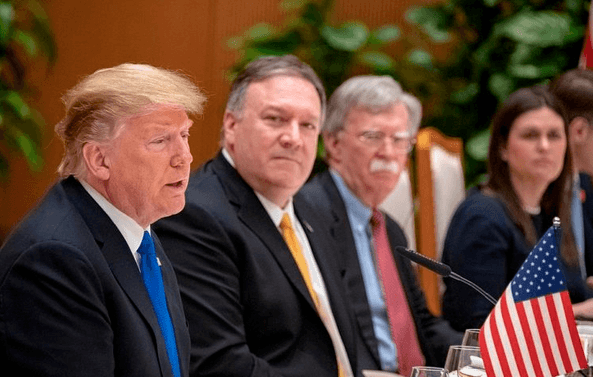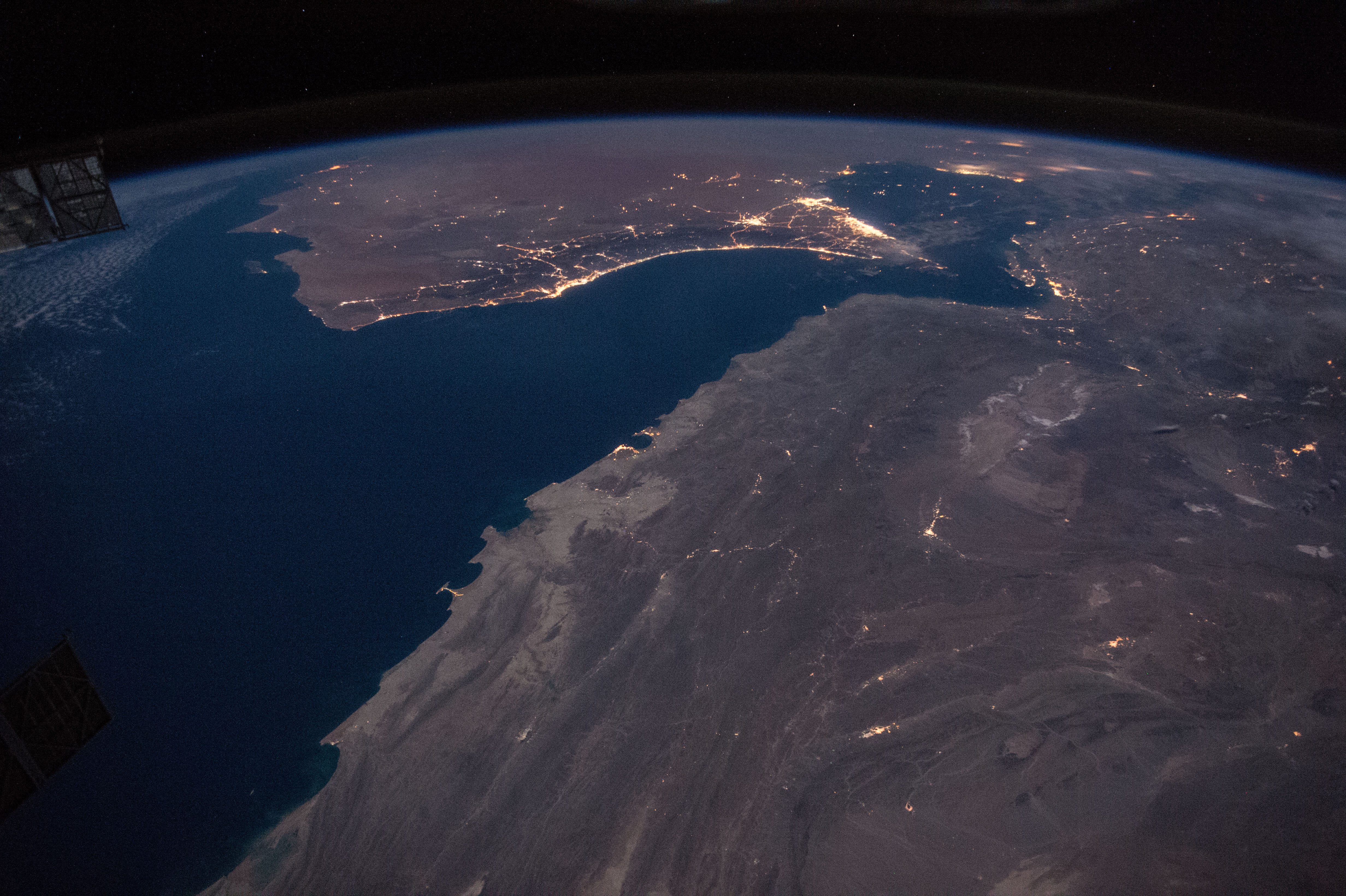The Dead Don’t Die: They March to War
[dropcap]H[/dropcap]ysteria reigns supreme. As in the new Jim Jarmusch movie, The Dead Don’t Die, The Return of the Living Neocon Dead, in a trashy rerun of the lead-up to Shock and Awe in 2003, keeps orchestrating the zombie march.
Yet no one in war-cheerleading US corporate media talks about the quadrillion derivative crisis that will gut the global economy if there’s an attack on Iran (I addressed it here.) Shutting down the Strait of Hormuz will bring down the 2.5 quadrillion world derivative market, largely wiping out the economies of all Western nations.
No one talks about the massive arsenal of Iranian anti-ship missiles, as well as ballistic and cruise missiles, some in positions visible to US satellites and drones, deployed all along the northern shore of the Persian Gulf. Those include the Russian SS-NX-26 Yakhont, which travels at Mach 2.9 speed. Iranian – as well as Russian and Chinese – anti-ship missiles can knock out the entire US Aircraft Carrier Task Force before their planes are even in range.
No one talks that it would take the US at least six months to place a proper combat army in Southwest Asia; the Pentagon scenario of a possible 120,000-strong troop deployment does not even begin to cut it.
And no one talks that Tehran won’t crack even under “maximum pressure.”
Saudi tankers are “sabotaged” – and Iran is instantly blamed, evidence-free. Some Brit bureaucrat says war can break out “by accident”. Consul Pompeus Minimus scares European poodles into isolating Iran.
And no one talks about Pompeo’s real target in his flash visit to Baghdad; to apply gangster tactics. Don’t deal with Tehran – or else. Buy “our” Make America Great Again (MAGA) electricity, not Iran’s. Get rid of the People Mobilization Units (PMUs). Or else.
Take me to false flag heaven
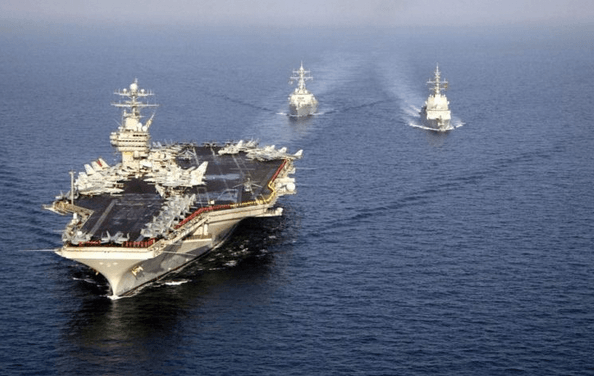
As usual, Americans are convinced of their military superiority. But what keeps those boats afloat, especially the carriers—ludicrous targets these days of precision missiles—is not their invulnerability to Iranian attack, but Iran's reluctance to detonate WW3 upon sinking much of an American fleet in the Gulf. You don't provoke a hysterical chauvinist, nuclear-armed moron without thinking twice.
The deal between the holy triad – US neocons, Zio-cons and Bibi Netanyahu – is that a false flag, any false flag, must be blamed on Tehran, thus forcing the Trump administration to protect and defend the “rules-based order”. Better yet, an even more elaborate false flag should induce an Iranian response – thus providing the rationale for an attack.
Trump at least is correct that it would take “a hell of a lot more” troops than 120,000 to attack Iran; more like a million troops. There’s nowhere to land them. No one – Iraq, Afghanistan, Turkmenistan, Azerbaijan, Armenia, Turkey, Pakistan – would welcome the “liberators”.
In an extremely hot scenario Tehran could even have instant access to nuclear missiles in the black market.
The bottom line: the neocon threat of war against Iran is a bluff.
Iranian Rear Admiral Hossein Khanzadi described it as a “theatrical” and “useless” attempt to “magnify the shadow of war.”
IRGC commander of aerospace force Brigadier General Amir Ali Hajizade famously said, “a US battleship with 6,000 personnel in the vicinity (Persian Gulf) with 40-50 jets onboard used to be a threat to us. Today it is a target.”
Then there’s the evolving drone-on-pipeline saga. The Houthis in Yemen targeted two pumping stations along the Saudi East-West pipeline – which carries oil from the Eastern province to the Red Sea. One of the stations caught fire. The hugely strategic pipeline – which allows Riyadh to bypass the Strait of Hormuz – has an enormous capacity, transporting 5 million barrels of crude a day. Operations had to be suspended.
Whether this drone attack was IRGC-directed, independent, or even a false flag is irrelevant; it provides just a taste of what might happen to the whole regional oil and gas infrastructure in case of a hot war.
Conversations with old-time Persian Gulf traders are quite enlightening. They attest, “if a pumping station is destroyed it takes two years to fill an order for a new pump. The Saudis maintain they have pumps in reserve. If all the pumps are destroyed in Saudi Arabia, no oil would flow for two years. The prime target would be Abqaiq. If this processing plant is destroyed, oil prices would soar.”
Abqaiq, with an enormous capacity of 7 million barrels a day, is the primary oil processing plant for Arabian extra light and Arabian light crude oils.
Assuming the drone attack was not a false flag, Persian Gulf traders were impressed with the accuracy of the drone at these distances for a precision hit. This would mean that Abqaiq itself is vulnerable. And there is absolutely nothing the Trump administration can do to stop the oil price from going to $200 a barrel just from Abqaiq being knocked out.
Moreover, no one is talking about insurance rates. As Persian Gulf traders insist, Vito, Trafigura, Glencore and other operators will not buy two million barrels in a tanker at $70 a barrel if there’s no insurance – or the rates go skywards.
It takes basically one single tanker going to the bottom of the Persian Gulf with two million barrels to permanently close the Strait of Hormuz – and interrupt all tanker traffic for 22 million barrels a day of crude, unless governments come in to insure the tankers even though they have no ability to protect them.
It’s all about maximum resistance.
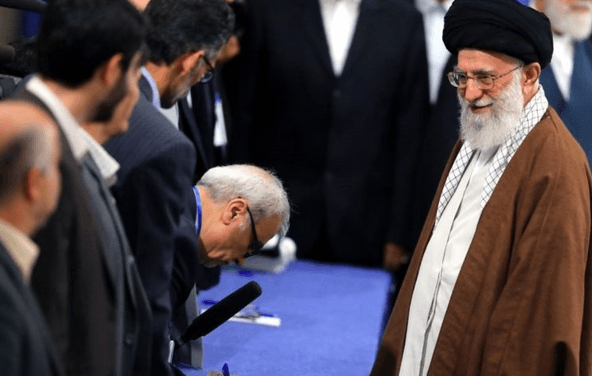 So what does Supreme Leader Ayatollah Khamenei want? Here it is, in his own words; “There won’t be any war. The Iranian nation has chosen the path of resistance… “We don’t seek a war, and they don’t either.”
So what does Supreme Leader Ayatollah Khamenei want? Here it is, in his own words; “There won’t be any war. The Iranian nation has chosen the path of resistance… “We don’t seek a war, and they don’t either.”
On top of it, Tehran won’t talk to Washington – following Trump’s “call me” caper – or sign any sort of modified or post-JCPOA nuclear deal. Khamenei; “[Such] negotiations are a poison.”
If President Trump had ever read Mackinder – and there’s no evidence he did – one might assume that he’s aiming at a new anti-Eurasia integration pivot centered on the Persian Gulf. And energy would be at the heart of the pivot.
If Washington were able to control everything, including “Big Prize” Iran, it would be able to dominate all Asian economies, especially China. Trump even said were that to happen, “decisions on the GNP of China will be made in Washington.”
Needless to add, this would be the icing in the geopolitical cake of destabilizing for good the New Silk Roads, or Belt and Road Initiative (BRI), the road map for Eurasia integration, of which Iran is a crucial node.
Now cue to President Putin musing on Iran-Russia relations; “I have repeatedly said in conversations with [our] Iranian partners that, in my opinion, it would be more rational for Iran to remain in this treaty, no matter what. Because as soon as Iran takes the first steps in response [to the US’ exit from the JCPOA], declares that it is withdrawing, tomorrow everyone will forget that the United States was the initiator of the destruction, and everything will be blamed on Iran”.
Arguably the key (invisible) takeaway of the meetings this week between Foreign Ministers Sergey Lavrov and Wang Yi, and then between Lavrov and Pompeo, is that Moscow made it quite clear that Iran will be protected by Russia in the event of an American showdown. Pompeo’s body language showed how rattled he was.
There will be much to talk about if Putin and Trump do meet at the G20 in Osaka next month. In the meantime, the dead may even die without going to war.
PEPE ESCOBAR: War on Iran & Calling America’s Bluff
Vast swathes of the West seem not to realize that if the Strait of Hormuz is shut down a global depression will follow, writes Pepe Escobar.
Special to Consortium News
 The Trump administration once again has graphically demonstrated that in the young, turbulent 21st century, “international law” and “national sovereignty” already belong to the Realm of the Walking Dead.
The Trump administration once again has graphically demonstrated that in the young, turbulent 21st century, “international law” and “national sovereignty” already belong to the Realm of the Walking Dead.
As if a deluge of sanctions against a great deal of the planet was not enough, the latest “offer you can’t refuse” conveyed by a gangster posing as diplomat, Consul Minimus Mike Pompeo, now essentially orders the whole planet to submit to the one and only arbiter of world trade: Washington.
First the Trump administration unilaterally smashed a multinational, UN-endorsed agreement, the JCPOA, or Iran nuclear deal. Now the waivers that magnanimously allowed eight nations to import oil from Iran without incurring imperial wrath in the form of sanctions will expire on May 2 and won’t be renewed.
The eight nations are a mix of Eurasian powers: China, India, Japan, South Korea, Taiwan, Turkey, Italy and Greece.
Apart from the trademark toxic cocktail of hubris, illegality, arrogance/ignorance and geopolitical/geo–economic infantilism inbuilt in this foreign policy decision, the notion that Washington can decide who’s allowed to be an energy provider to emerging superpower China does not even qualify as laughable. Much more alarming is the fact that imposing a total embargo of Iranian oil exports is no less than an act of war.
Ultimate Neocon Wet Dream
Those subscribing to the ultimate U.S, neocon and Zionist wet dream – regime change in Iran – may rejoice at this declaration of war. But as Professor Mohammad Marandi of the University of Tehran has elegantly argued, “If the Trump regime miscalculates, the house can easily come crashing down on its head.”
Reflecting the fact Tehran seems to have no illusions regarding the utter folly ahead, the Iranian leadership — if provoked to a point of no return, Marandi additionally told me — can get as far as “destroying everything on the other side of the Persian Gulf and chasing the U.S. out of Iraq and Afghanistan. When the U.S. escalates, Iran escalates. Now it depends on the U.S. how far things go.”
This red alert from a sensible academic perfectly dovetails with what’s happening with the structure of the Islamic Revolutionary Guard Corps (IRGC) — recently branded a “terrorist organization” by the United States. In perfect symmetry, Iran’s Supreme National Security Council also branded the U.S. Central Command — CENTCOM — and “all the forces connected to it” as a terrorist group.
The new IRGC commander-in-chief is Brigadier General Hossein Salami, 58. Since 2009 he was the deputy of previous commander Mohamamd al-Jafari, a soft spoken but tough as nails gentleman I met in Tehran two years ago. Salami, as well as Jafari, is a veteran of the Iran-Iraq war; that is, he has actual combat experience. And Tehran sources assure me that he can be even tougher than Jafari.
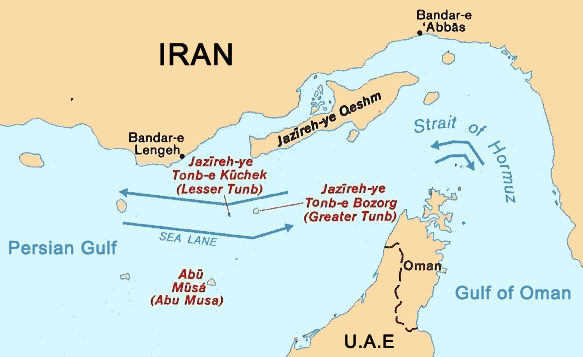 In tandem, IRGC Navy Commander Rear Admiral Alireza Tangsiri has evoked the unthinkable in terms of what might develop out of the U.S. total embargo on Iran oil exports; Tehran could block the Strait of Hormuz.
In tandem, IRGC Navy Commander Rear Admiral Alireza Tangsiri has evoked the unthinkable in terms of what might develop out of the U.S. total embargo on Iran oil exports; Tehran could block the Strait of Hormuz.
Western Oblivion
Vast swathes of the ruling classes across the West seem to be oblivious to the reality that if Hormuz is shut down, the result will be an absolutely cataclysmic global economic depression.
Warren Buffett, among other investors, has routinely qualified the 2.5 quadrillion derivatives market as a weapon of financial mass destruction. As it stands, these derivatives are used — illegally — to drain no less than a trillion U.S. dollars a year out of the market in manipulated profits.
Considering historical precedents, Washington may eventually be able to set up a Persian Gulf of Tonkin false flag. But what next?
If Tehran were totally cornered by Washington, with no way out, the de facto nuclear option of shutting down the Strait of Hormuz would instantly cut off 25 percent of the global oil supply. Oil prices could rise to over $500 a barrel, to even $1000 a barrel. The 2.5 quadrillion of derivatives would start a chain reaction of destruction.
Unlike the shortage of credit during the 2008 financial crisis, the shortage of oil could not be made up by fiat instruments. Simply because the oil is not there. Not even Russia would be able to re-stabilize the market.
It’s an open secret in private conversations at the Harvard Club – or at Pentagon war-games for that matter – that in case of a war on Iran, the U.S. Navy would not be able to keep the Strait of Hormuz open.
Russian SS-NX-26 Yakhont missiles — with a top speed of Mach 2.9 — are lining up the Iranian northern shore of the Strait of Hormuz. There’s no way U.S. aircraft carriers can defend a barrage of Yakhont missiles.
Then there are the SS-N-22 Sunburn supersonic anti-ship missiles — already exported to China and India — flying ultra-low at 1,500 miles an hour with dodging capacity, and extremely mobile; they can be fired from a flatbed truck, and were designed to defeat the U.S. Aegis radar defense system.
What Will China Do?
The full–frontal attack on Iran reveals how the Trump administration bets on breaking Eurasia integration via what would be its weakeast node; the three key nodes are China, Russia and Iran. These three actors interconnect the whole spectrum; Belt and Road Initiative; the Eurasia Economic Union; the Shanghai Cooperation Organization; the International North-South Transportation Corridor; the expansion of BRICS Plus.
So there’s no question the Russia-China strategic partnership will be watching Iran’s back. It’s no accident that the trio is among the top existential “threats” to the U.S., according to the Pentagon. Beijing knows how the U.S. Navy is able to cut it off from its energy sources. And that’s why Beijing is strategically increasing imports of oil and natural gas from Russia; engineering the “escape from Malacca” also must take into account a hypothetical U.S. takeover of the Strait of Hormuz.
A plausible scenario involves Moscow acting to defuse the extremely volatile U.S.-Iran confrontation, with the Kremlin and the Ministry of Defense trying to persuade President Donald Trump and the Pentagon from any direct attack against the IRGC. The inevitable counterpart is the rise of covert ops, the possible staging of false flags and all manner of shady Hybrid War techniques deployed not only against the IRGC, directly and indirectly, but against Iranian interests everywhere. For all practical purposes, the U.S. and Iran are at war.
Within the framework of the larger Eurasia break-up scenario, the Trump administration does profit from Wahhabi and Zionist psychopathic hatred of Shi’ites. The “maximum pressure” on Iran counts on Jared of Arabia Kushner’s close WhatsApp pal Mohammad bin Salman (MbS) in Riyadh and MbS’s mentor in Abu Dhabi, Sheikh Zayed, to replace the shortfall of Iranian oil in the market. Bu that’s nonsense — as quite a few wily Persian Gulf traders are adamant Riyadh won’t “absorb Iran’s market share” because the extra oil is not there.
Much of what lies ahead in the oil embargo saga depends on the reaction of assorted vassals and semi-vassals. Japan won’t have the guts to go against Washington. Turkey will put up a fight. Italy, via Salvini, will lobby for a waiver. India is very complicated; New Delhi is investing in Iran’s Chabahar port as the key hub of its own Silk Road, and closely cooperates with Tehran within the INSTC framework. Would a shameful betrayal be in the cards?
China, it goes without saying, will simply ignore Washington.
Iran will find ways to get the oil flowing because the demand won’t simply vanish with a magic wave of an American hand. It’s time for creative solutions. Why not, for instance, refuel ships in international waters, accepting gold, all sorts of cash, debit cards, bank transfers in rubles, yuan, rupees and rials — and everything bookable on a website?
Now that’s a way Iran can use its tanker fleet to make a killing. Some of the tankers could be parked in — you got it — the Strait of Hormuz, with an eye on the price at Jebel Ali in the UAE to make sure this is the real deal. Add to it a duty free for the ships crews. What’s not to like? Ship owners will save fortunes on fuel bills, and crews will get all sorts of stuff at 90 percent discount in the duty free.
And let’s see whether the EU has grown a spine — and really turbo-charge their Special Purpose Vehicle (SPV) alternative payment network conceived after the Trump administration ditched the JCPOA. Because more than breaking up Eurasia integration and implementing neocon regime change, this is about the ultimate anathema; Iran is being mercilessly punished because it has bypassed the U.S. dollar on energy trade.

Distinguished Collaborator Pepe Escobar is an independent geopolitical analyst. He writes for RT, Sputnik and TomDispatch, and is a frequent contributor to websites and radio and TV shows ranging from the US to East Asia. He is the former roving correspondent for Asia Times Online. Born in Brazil, he’s been a foreign correspondent since 1985, and has lived in London, Paris, Milan, Los Angeles, Washington, Bangkok and Hong Kong. Even before 9/11 he specialized in covering the arc from the Middle East to Central and East Asia, with an emphasis on Big Power geopolitics and energy wars. He is the author of “Globalistan” (2007), “Red Zone Blues” (2007), “Obama does Globalistan” (2009) and “Empire of Chaos” (2014), all published by Nimble Books. His latest book is “2030”, also by Nimble Books, out in December 2015.
This work is licensed under a Creative Commons Attribution-NonCommercial 4.0 International License.

